|
 I
don't know how this book came to my attention, but it has been a
fantastic read so far. The author isn't an economist but he
thinks like one! If we are going to rid ourselves of oil, gas,
et al., then Epstein asks, "What have these fossil fuels done for
us?" Of course, the answer is "Plenty!" He cites lots of
interesting data showing how much better life has become since the
wide-spread use of fossil fuels. Doh! I may have heard
about this from Tom Woods' excellent
podcast (Episode
#285). I
don't know how this book came to my attention, but it has been a
fantastic read so far. The author isn't an economist but he
thinks like one! If we are going to rid ourselves of oil, gas,
et al., then Epstein asks, "What have these fossil fuels done for
us?" Of course, the answer is "Plenty!" He cites lots of
interesting data showing how much better life has become since the
wide-spread use of fossil fuels. Doh! I may have heard
about this from Tom Woods' excellent
podcast (Episode
#285). |
 |
|
 I
have the real distinct memory that I saw the Russian film based on
this book back in 1972. I mostly remember being confused a
lot, which is to be expected. I just purchased the film on
blu-ray and watching it hasn't struck any familiar chords.
Still, I wanted to read the source novel and came to find out that
the original Polish wasn't translated into English until just a
couple of years ago. Previous English editions of the book had
been translated from a French copy and it seems to have been viewed
as a weak version (although popular). This newer translation
is, so far, only available as a Kindle and is not as a hard copy.
So, I have downloaded it and started reading. This is my first
real attempt to read a book this way, so maybe I'll finally lurch
into this technology. The book is supposed to be quite
different in its themes than the movie (or, even than the
re-make starring George Clooney). I
have the real distinct memory that I saw the Russian film based on
this book back in 1972. I mostly remember being confused a
lot, which is to be expected. I just purchased the film on
blu-ray and watching it hasn't struck any familiar chords.
Still, I wanted to read the source novel and came to find out that
the original Polish wasn't translated into English until just a
couple of years ago. Previous English editions of the book had
been translated from a French copy and it seems to have been viewed
as a weak version (although popular). This newer translation
is, so far, only available as a Kindle and is not as a hard copy.
So, I have downloaded it and started reading. This is my first
real attempt to read a book this way, so maybe I'll finally lurch
into this technology. The book is supposed to be quite
different in its themes than the movie (or, even than the
re-make starring George Clooney). |
 |
|
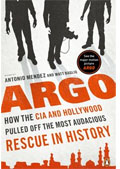 I
have seen the movie and got interested enough in the story to buy
the book. It is interesting, but not well-written. Lots
of repetition and a pretty thin story line work against making this
book. Supposedly the movie was based on a magazine article and
that is probably enough. Indeed, the story of the rescue
appears as just a chapter in an earlier book by Mendez. So,
this is just an attempt to cash in on the publicity that the movie
has created. I guess that works, since I, too, bought the
book! The actual story really doesn't take place until late in
the book. There are some interesting side stories, and back
stories. One valuable lesson from the book is just how much
literary license the moviemakers took in making their film.
Aside from the creation of a pretend Hollywood studio and that the
six Americans assumed these personas to escape Iran, every detail
seems to be just pure fabrication to make the story more exciting. I
have seen the movie and got interested enough in the story to buy
the book. It is interesting, but not well-written. Lots
of repetition and a pretty thin story line work against making this
book. Supposedly the movie was based on a magazine article and
that is probably enough. Indeed, the story of the rescue
appears as just a chapter in an earlier book by Mendez. So,
this is just an attempt to cash in on the publicity that the movie
has created. I guess that works, since I, too, bought the
book! The actual story really doesn't take place until late in
the book. There are some interesting side stories, and back
stories. One valuable lesson from the book is just how much
literary license the moviemakers took in making their film.
Aside from the creation of a pretend Hollywood studio and that the
six Americans assumed these personas to escape Iran, every detail
seems to be just pure fabrication to make the story more exciting. |
 |
|
 I
read Heinlein's classic years ago, but didn't remember much of the
specifics (of course!). But, it comes up every now and then as
sort of a libertarian cult favorite, so I decided to pick it up
again. It is a pretty fast read, although you do have to wade
through a peculiar language that Heinlein creates for the "loonies."
It is, I believe, the first instance where "TANSTAAFL" makes an
appearance, and I usually recommend it to my econ students as a
consequence. I
read Heinlein's classic years ago, but didn't remember much of the
specifics (of course!). But, it comes up every now and then as
sort of a libertarian cult favorite, so I decided to pick it up
again. It is a pretty fast read, although you do have to wade
through a peculiar language that Heinlein creates for the "loonies."
It is, I believe, the first instance where "TANSTAAFL" makes an
appearance, and I usually recommend it to my econ students as a
consequence.
Anyway, the story is a good one. The state, and
the crony capitalist "Lunar Authority" are relentlessly disparaged.
There is a nice section in Chapter 22 where Professor de la Paz
muses about how government can be different, and much less involved
in our lives. He suggests that the government be funded
strictly through voluntary taxation, which sounds like a great idea!
He also wonders about non-geographic voting, which is something I
ask my students to also think about. |
 |
|
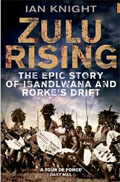 One
of my all time favorite movies is Zulu (not to be confused with the
awful Zulu Dawn!), starring Stanley Baker and Michael Caine (in his
first movie role). I recently decided to gt the new blu-ray
version, and it is fantastic. The image quality is quite
superior to my older dvd. Anyway, I wanted to know more and
found lots of positive comments on Ian Knight's epic book, Zulu
Rising. It has lots of the back story here, going back even to
the days of Shaka. More of the book seems to be about the
Isandlwana disaster, which the movie glosses over (and that's good).
Still, I am just getting into the battle and already nearly 400
pages into this 700+ page book. Lots of names just zoom by me,
but I do tend to remember the ones that repeat a lot. The
maps, located at the beginning, are a bit spartan and more/better
could be done here. Still, very compelling reading. One
of my all time favorite movies is Zulu (not to be confused with the
awful Zulu Dawn!), starring Stanley Baker and Michael Caine (in his
first movie role). I recently decided to gt the new blu-ray
version, and it is fantastic. The image quality is quite
superior to my older dvd. Anyway, I wanted to know more and
found lots of positive comments on Ian Knight's epic book, Zulu
Rising. It has lots of the back story here, going back even to
the days of Shaka. More of the book seems to be about the
Isandlwana disaster, which the movie glosses over (and that's good).
Still, I am just getting into the battle and already nearly 400
pages into this 700+ page book. Lots of names just zoom by me,
but I do tend to remember the ones that repeat a lot. The
maps, located at the beginning, are a bit spartan and more/better
could be done here. Still, very compelling reading.
Postscript:
After finishing the first 400+ pages and getting through the main
battle of Isandlwana, I decided to watch the movie Zulu Dawn again.
As noted above, I thought it was awful on my first viewing.
Now, knowing more about the story, I have changed my opinion.
The movie is a rather faithful representation of actual events, at
least as they were understood in the 1970s. I think the reason
I disliked the film was the heavy-handed melodrama and the perfectly
hideous musical score. |
 |
|
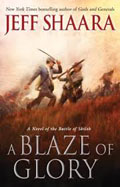 During
the first couple of weeks in July 2013 I drove back east to attend
the 150th re-enactment of the Battle of Gettysburg. I decided
to make it a Civil War tour and stopped and spent a day at Shiloh
(on the way), Chickamauga and Vicksburg (on the way back) as part of
this trip. I had not been to any of these sites before and the
full day I allocated to each visit was totally filled up.
During my four days at Gettysburg, I heard a presentation by Jeff
Shaara about his father (author of Killer Angels) and his journey
into Civil War storytelling. He decided to pen a trilogy to
coincide with the 150th commemoration of these battles and his book
on Shiloh, A Blaze of Glory, came out last year. So, I picked
up a copy. So far, I can't put it down and am reasonably sure
that I will get more of his historical novels. During
the first couple of weeks in July 2013 I drove back east to attend
the 150th re-enactment of the Battle of Gettysburg. I decided
to make it a Civil War tour and stopped and spent a day at Shiloh
(on the way), Chickamauga and Vicksburg (on the way back) as part of
this trip. I had not been to any of these sites before and the
full day I allocated to each visit was totally filled up.
During my four days at Gettysburg, I heard a presentation by Jeff
Shaara about his father (author of Killer Angels) and his journey
into Civil War storytelling. He decided to pen a trilogy to
coincide with the 150th commemoration of these battles and his book
on Shiloh, A Blaze of Glory, came out last year. So, I picked
up a copy. So far, I can't put it down and am reasonably sure
that I will get more of his historical novels. |
 |
|
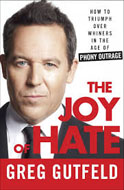 I
have seen Gutfeld promote this book ad nauseum and finally broke
down and bought a copy. But, not the overpriced "signed by the
author" version. Which, I'm pretty sure, has exactly the same
material as in the copy I got. I did pen a short review on
Amazon -
Chapters are shorter than
the ones in "The Bible of Unspeakable Truths." Could use a photo
collage in the middle of the book, or at least some occasional
unicorn drawings. I stand by my review! A great
read. Goes fast. The "how to" part of the book is really
only the last chapter, so one might complain that the title is
misrepresentative. And, I read it so fast, I didn't get a
chance to put it up on my home page! I
have seen Gutfeld promote this book ad nauseum and finally broke
down and bought a copy. But, not the overpriced "signed by the
author" version. Which, I'm pretty sure, has exactly the same
material as in the copy I got. I did pen a short review on
Amazon -
Chapters are shorter than
the ones in "The Bible of Unspeakable Truths." Could use a photo
collage in the middle of the book, or at least some occasional
unicorn drawings. I stand by my review! A great
read. Goes fast. The "how to" part of the book is really
only the last chapter, so one might complain that the title is
misrepresentative. And, I read it so fast, I didn't get a
chance to put it up on my home page! |
 |
|
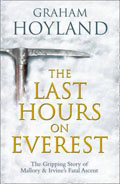 Part
way through reading Edmund Hillary's book, High
Adventure, I realized I needed to start "at the beginning."
So, I started ordering books, some old and some new. This one,
by Hoyland, was just published and was about Mallory's attempt up
Everest in 1924. It starts out with a nice review of the
history of Everest exploration, so has satisfied my interest
in that respect, although I now have other books that are on my
reading list - probably way too many! Part
way through reading Edmund Hillary's book, High
Adventure, I realized I needed to start "at the beginning."
So, I started ordering books, some old and some new. This one,
by Hoyland, was just published and was about Mallory's attempt up
Everest in 1924. It starts out with a nice review of the
history of Everest exploration, so has satisfied my interest
in that respect, although I now have other books that are on my
reading list - probably way too many!
I read this as soon as it arrived and it only took me a few days.
I wrote up this review for Amazon:
I just finished this
book. I am a novice when it comes to Mt. Everest related material
and got hooked after watching the Discovery series, "Everest: Beyond
the Limit." Hoyland's book seemed like a good place to start a more
in-depth study of this topic. I appreciated the historical review he
provides and found his personal connections - through family as well
as through his own Everest experiences - to be compelling pieces to
his story.
But, Mallory's trek up the mountain takes a long pause in the
second half of the book and we only return to the final "last hours"
at the end, despite the promise contained in the sub-title that this
would be a "gripping story of Mallory & Irvine's fatal ascent." I
would have liked more here, especially a more careful review of the
various theories and views. [The 1960 Chinese expedition for example
gets extremely short shrift.]
Still, I was stimulated by Hoyland's writing and have ordered more
Everest books, from the 1921 Reconnaissance Expedition book to
Unsworth's massive "Everest, The Mountaineering History." I also
have the Everest books by Hillary and Smythe, and look forward to
reading their accounts. I also found videos on the web, including
"The Wildest Dream" (which I realized I had seen before) and
"Galahad of Everest." I watched both during breaks from reading the
book. So, if a book can pique your interest and get you to dig
deeper and read more, I'd say it was worthwhile.
One shortcoming I will mention is the lack of reasonable maps, of
the area in general and the mountain in particular. The color photo
in the book is not sufficient and I found myself looking at maps in
Hillary's book and even using Google Earth to get oriented at times. |
 |
|
 I
"discovered" the Everest
series on my Netflix. It is a few years old and consists
of 19 episodes stretched out over three hiking seasons, two from the
north side of Everest and one from the south. I was absolutely
spellbound, but any inkling I might have had for ascending the
world's tallest mountain was quickly quashed. But, fascinating
to watch. So, I got interested in more, so I ordered Hillary's
first person account of his ascent up the mountain. Was he
first? I have another book coming about Mallory, and I am
leaning to the view that he was first up the mountain, back in 1924. I
"discovered" the Everest
series on my Netflix. It is a few years old and consists
of 19 episodes stretched out over three hiking seasons, two from the
north side of Everest and one from the south. I was absolutely
spellbound, but any inkling I might have had for ascending the
world's tallest mountain was quickly quashed. But, fascinating
to watch. So, I got interested in more, so I ordered Hillary's
first person account of his ascent up the mountain. Was he
first? I have another book coming about Mallory, and I am
leaning to the view that he was first up the mountain, back in 1924. |
 |
|
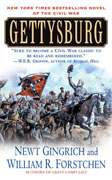 I had
heard good things about these books, but from unreliable sources.
That's kind of a joke. Hannity
was extolling the virtues of Grant Comes East when Newt
Gingrich was on his show. Well, I can't really recall any examples
of a host dissing a book authored by a guest! I am curious about
how much Newt actually wrote and wouldn't be surprised if not all of the
prose is Forstchen's. So, I ordered the book and realized before I
had finished one single paragraph that I needed to read Gettyburg
first, as this book is a sequel. So, I ordered it and within a month, or
so, I started reading. At first, I wasn't impressed. I know a lot
about the battle at Gettysburg and the novelization wasn't doing
anything for me. But, at around page 80, I suddenly realized what
I had totally forgotten about this book - it is an alternate
history. I had
heard good things about these books, but from unreliable sources.
That's kind of a joke. Hannity
was extolling the virtues of Grant Comes East when Newt
Gingrich was on his show. Well, I can't really recall any examples
of a host dissing a book authored by a guest! I am curious about
how much Newt actually wrote and wouldn't be surprised if not all of the
prose is Forstchen's. So, I ordered the book and realized before I
had finished one single paragraph that I needed to read Gettyburg
first, as this book is a sequel. So, I ordered it and within a month, or
so, I started reading. At first, I wasn't impressed. I know a lot
about the battle at Gettysburg and the novelization wasn't doing
anything for me. But, at around page 80, I suddenly realized what
I had totally forgotten about this book - it is an alternate
history.
I realized it only at the end of the first day's
battle. That is when the alternate history starts to kick in.
I suddenly found it much more interesting since it was now a
novelization about this fictional outcome. I was quite wrapped
up in the book and could hardly put it down. And, then, I
picked up my copy of the second book and started it. Not as
compelling as the first book, but it is interesting in that a
Confederate victory at Gettysburg would still be hard (if not
impossible) to turn into an overall victory in the war.
I then turned to the third, and final book, in the
series, Never Call Retreat. Because I read all three in
quick succession, the repetitive use of certain phrases bothered me.
Still, I think the battles were nicely described. The
concluding notion that the South would have lost anyway is pretty
easy to accept, although interesting that Lee's "victory" at
Gettysburg hastened his eventual defeat. |
 |
|
 I have had this book for some time but am quite sure that I
hadn't read all 21 stories. But, some I have read over and
over again. These are the ones that were made into movies.
Especially memorable for me are "Paycheck" and "We Can Remember It
For You Wholesale." [The latter was made into Total Recall.].
Also here are the stories turned into The Minority Report, Imposter
and The Adjustment Bureau. [The story for the latter is
titled, "Adjustment Team."] In fact, it seems that every time
I watch a movie made from one of Dick's stories, I feel compelled to
read them again. So, finally, I am going through the book
completely.
I have had this book for some time but am quite sure that I
hadn't read all 21 stories. But, some I have read over and
over again. These are the ones that were made into movies.
Especially memorable for me are "Paycheck" and "We Can Remember It
For You Wholesale." [The latter was made into Total Recall.].
Also here are the stories turned into The Minority Report, Imposter
and The Adjustment Bureau. [The story for the latter is
titled, "Adjustment Team."] In fact, it seems that every time
I watch a movie made from one of Dick's stories, I feel compelled to
read them again. So, finally, I am going through the book
completely.
Postscript:
Interesting stories, by and large. Plot issues do abound and I
found that I was often going to on-line sources for others to offer
up interpretations of these stories. I guess that is OK, but
when a story doesn't really end, you do feel a little frustrated. |
 |
|
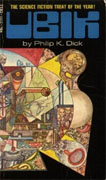 After
a lull, I am back to reading more of the novels of Philip K. Dick.
I have never heard anything about this one before. I don't
know what "Ubik" is, except that at the beginning of each chapter
there is an opening advertisement for some product whose name is "Ubik."
That is, it is as if everything was called "Ubik." So, saying,
"Get me a Ubik," could mean you want a sandwich, a power tool, your
accountant on the phone, or whatever. I'm sure I'll find out
more later. Well, now that I think about it, I'm not so sure
I'll find out anything! After
a lull, I am back to reading more of the novels of Philip K. Dick.
I have never heard anything about this one before. I don't
know what "Ubik" is, except that at the beginning of each chapter
there is an opening advertisement for some product whose name is "Ubik."
That is, it is as if everything was called "Ubik." So, saying,
"Get me a Ubik," could mean you want a sandwich, a power tool, your
accountant on the phone, or whatever. I'm sure I'll find out
more later. Well, now that I think about it, I'm not so sure
I'll find out anything!
Postscript: Well, I figured out that Ubik
meant ubiquitous a couple of chapters before that was finally
reveals. Interesting story and apparently there are efforts
being made to turn it into a movie.
|
 |
|
 I
had read some positive comments on the movie, which came out many
months ago. Given its dystopian future, and that government
was the source, I was looking forward to seeing the movie when it
came out on DVD. So, I got it and watched it and liked it so
much I ordered the books (there are only three, aren't there?).
And, now I am reading the first one. So far I am amazed at how
closely the movie followed the book. I think it is an
advantage to have a visual recollection (from the movie) when
reading the book; it just adds that much more depth. I
had read some positive comments on the movie, which came out many
months ago. Given its dystopian future, and that government
was the source, I was looking forward to seeing the movie when it
came out on DVD. So, I got it and watched it and liked it so
much I ordered the books (there are only three, aren't there?).
And, now I am reading the first one. So far I am amazed at how
closely the movie followed the book. I think it is an
advantage to have a visual recollection (from the movie) when
reading the book; it just adds that much more depth.
Postscript: The book was great. The
series ... well, it suffered from what I call "The Matrix syndrome."
That occurs when the author (or filmmakers) try to actually satisfy
the fans with a continuation of the story and its ultimate
conclusion. I guarantee that most fans will not be happy with
the conclusion, no matter what it is. Sometimes, it's just
better to leave things be, and I think that would have been better
for this series. I would have preferred more stories set in
that milieu rather than stories that led to its dissolution.
Now, sometimes that works - The Lord of the Rings comes to mind.
But, at the outset, we know that the destruction of evil is the
objective. If I had to rate them, I'd give a 9 to the first
book, a 6 to the second and a 3 to the third. Still, I'll
probably go see the movies when they come out! |
 |
|
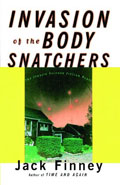 My
favorite event in Flagstaff is the annual Celtic
Festival. I only wish they did more to promote the
bagpipers, which I really like to listen to. Invariably they
will play Amazing Grace. And that will always remind me of the
scene from the 1978 movie Invasion
of the Body Snatchers where the Donald Sutherland character
happens upon the ship being loaded up and we hear this music
(played on bagpipes). So, I watched the film again and was
prompted to look up the source. I have Finney's Time
and Again, which is fantastic, and didn't realize that he was
the author of the source novel for this movie. So, I ordered
the book. My
favorite event in Flagstaff is the annual Celtic
Festival. I only wish they did more to promote the
bagpipers, which I really like to listen to. Invariably they
will play Amazing Grace. And that will always remind me of the
scene from the 1978 movie Invasion
of the Body Snatchers where the Donald Sutherland character
happens upon the ship being loaded up and we hear this music
(played on bagpipes). So, I watched the film again and was
prompted to look up the source. I have Finney's Time
and Again, which is fantastic, and didn't realize that he was
the author of the source novel for this movie. So, I ordered
the book.
It turns out that I might have done some
more research. I knew that the book was written in the 1950s,
and within a couple of years was turned into a movie,
which I saw when I was a kid. I thought it was great and when
the newer version came out in 1978, I was quite excited to see
it. [Two more movie versions have since been made, a dreadful
one in 1993 and a
pretty good one in 2007,
the latter starring Daniel Craig.]
The book I ordered, with the cover shown
above, turned out to be a re-edited version that came out in 1978,
at/about the same time as the movie. I read a reference to the
main character's 1973 auto and to him having watched part of a movie
titled, "Time and Again!" I did some digging and
realized what had happened. I am under the impression that
there is just a bit of updating here, but I may have to track down
the 1953 version to see for myself.
Postscript: The book was far more upbeat
in its ending than the movies, which surprised me. But, it was
a good read. I got hold of the earlier edition and as I noted
above, the edits look minor, perhaps with the exception of a
slightly different dynamic between the lead characters, reflecting a
change in societal views on the role of women that changed from the
1950s to the late 1970s! |
 |
|
 I
read a lot of Sci Fi when I was in high school and college. I have
kept up a more erratic interest since then, and now seems to be one
of those times when I just can't get enough. I read this, and
others by Hoyle, early on and remember that there were interesting
themes that made you think outside the box. So, I am plunging
back in on this one. I can already tell that the writing
performance is not as good as Smith's, but may be as good as Brown! I
read a lot of Sci Fi when I was in high school and college. I have
kept up a more erratic interest since then, and now seems to be one
of those times when I just can't get enough. I read this, and
others by Hoyle, early on and remember that there were interesting
themes that made you think outside the box. So, I am plunging
back in on this one. I can already tell that the writing
performance is not as good as Smith's, but may be as good as Brown!
Postscript:
After the fact, I'd say that Brown is a better writer. I
really couldn't wait to be done with this book. I was able to
recall some of the content as I read through this book again, but it
wasn't compelling to me. The style is awkward and the
conclusion is not revealing. The basic idea was interesting,
but this would have been better as a short story rather than a
full-fledged novel. The musical angle is not likely to
resonate with many readers (myself included) although it did prompt
me to do some web searches to find out more. |
 |
|
 I
read Smith's Gorky Park years ago, although I can't remember if it
was before or after the movie.
I also read the follow-up, Polar
Star, and enjoyed that quite a bit. I'm sure I read Red
Square and then got sidetracked with his Stallion
Gate which did not continue the adventures of Arkady
Renko. I've had this book, which is the 4th Renko book,
for some years. I've just gotten started and two thoughts jump
out at me. First, he is a much better writer than Brown!
And, his ability to convey rather gruesome detail is quite
amazing. Of course, that was a key element in Gorky Park, and
that has continued with this novel as well. I
read Smith's Gorky Park years ago, although I can't remember if it
was before or after the movie.
I also read the follow-up, Polar
Star, and enjoyed that quite a bit. I'm sure I read Red
Square and then got sidetracked with his Stallion
Gate which did not continue the adventures of Arkady
Renko. I've had this book, which is the 4th Renko book,
for some years. I've just gotten started and two thoughts jump
out at me. First, he is a much better writer than Brown!
And, his ability to convey rather gruesome detail is quite
amazing. Of course, that was a key element in Gorky Park, and
that has continued with this novel as well.
Postscript:
Well, Smith sure has a handle on the gruesome! That was his
strong suit in Gorky Park, and it has continued with these other Renko stories. The plot was a bit over the top, which I
suppose is to be expected. Gorky Park still stands out as a
great story that is believable, but in this case . . . |
 |
|
 Well,
this one has been on my reading list for some time now. I have
seen the movie quite a few times, although I don't own a copy.
Go figure! This book pre-dates The Da Vinci Code, which I have
read years ago, even though the movies came out in reverse
order. I have heard people say that this is the better book. I
won't really know, since it has been too long since I read the Da
Vinci book. Still, having just started, I can say it is a page
turner and I am quite immersed. I can also say that the
attempts at providing descriptive background is annoying.
Whether the pilot of the X-33 jetplane really likes to listen to
Garth Brooks is just TMI! I get the constant sense that Brown
is just going through the motions - here, have some more
tidbits. If the description doesn't further the plot, get rid
of it! Well,
this one has been on my reading list for some time now. I have
seen the movie quite a few times, although I don't own a copy.
Go figure! This book pre-dates The Da Vinci Code, which I have
read years ago, even though the movies came out in reverse
order. I have heard people say that this is the better book. I
won't really know, since it has been too long since I read the Da
Vinci book. Still, having just started, I can say it is a page
turner and I am quite immersed. I can also say that the
attempts at providing descriptive background is annoying.
Whether the pilot of the X-33 jetplane really likes to listen to
Garth Brooks is just TMI! I get the constant sense that Brown
is just going through the motions - here, have some more
tidbits. If the description doesn't further the plot, get rid
of it! Postscript:
I'd say that the movie version is not only faithful (LOL) to the
book, but improves upon it. Some of the plot complexities got
the boot and I am sure glad they didn't try to make Tom Hanks appear
to be a super stud by jumping from the helicopter! But, that
they changed the assassin from an Arab to some non-descript European
ex-special forces killer was disingenuous in the same way (albeit to
a much lesser degree) as was done in The
Sum of All Fears. Also, the additional issue about fathers
and sons would have made the movie unbearable. |
 |
|
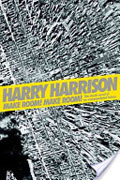 OK,
I'm giving PKD a rest and turning to another book that was made into
one of my favorite films. The book is titled, "Make
Room! Make Room!" and the movie was titled, "Soylent
Green." It certainly is worth a new version, although
I think that it holds up well. There is a bias on the part of
Harrison that misunderstands economics and I'll try to address that
in a postscript, or in a separate blog after I'm done with the book. OK,
I'm giving PKD a rest and turning to another book that was made into
one of my favorite films. The book is titled, "Make
Room! Make Room!" and the movie was titled, "Soylent
Green." It certainly is worth a new version, although
I think that it holds up well. There is a bias on the part of
Harrison that misunderstands economics and I'll try to address that
in a postscript, or in a separate blog after I'm done with the book.
Postscript: HH does a great job of describing a fully dysfunctional state.
But, he doesn't quite get to the point that it is a problem of
government. When the character Sol rants and raves about the
injustice in the world, it sounds like a screed against business,
but really should be a condemnation of the state. What is
funny about this book, and others of its ilk, is how totally wrong
they are about our demise. The book was written in the
mid-1960s and takes place in 1999, when all the coal and oil have
been used up, there are food shortages, et al. Since it is now
2012, we can easily dismiss the hysteria of overpopulation that this
novel feeds off of. I give the movie version higher marks than
the book at better showing the distopia of government control. |
 |
|
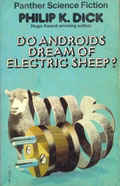 In
my continuing quest to read a lot of Philip K. Dick's work, I have
gone back to look at his classic Do Androids Dream of Electric
Sheep? which I read years ago after watching the movie that was
based on it, Blade
Runner. [Click the image to read it free on-line.] I
remember that, unlike in the movie, Deckard was married and that
there was a strong religious component. It was the first work
by Dick (as best I know) that was turned into a movie and Ridley
Scott took plenty of literary license with it, but I think for the
better. In
my continuing quest to read a lot of Philip K. Dick's work, I have
gone back to look at his classic Do Androids Dream of Electric
Sheep? which I read years ago after watching the movie that was
based on it, Blade
Runner. [Click the image to read it free on-line.] I
remember that, unlike in the movie, Deckard was married and that
there was a strong religious component. It was the first work
by Dick (as best I know) that was turned into a movie and Ridley
Scott took plenty of literary license with it, but I think for the
better. Postscript:
Better than I remembered it from years ago. Unlike my comment
for Dick's earlier work (below), this one does connect up characters
and pretty much tie up loose ends. Quite different from the
movie in many respects although I watched the movie again and I kept
muttering "kipple" at the TV. |
 |
|
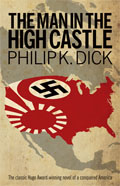 I
have long enjoyed reading Philip K. Dick's short stories, especially
since so many have been made into movies, even if they suffer from
from a false perspective (see Paycheck). So, I have recently
seen references to his book, The Man in the High Castle and decided
to pick up the new
collection out at Amazon. I may not read all the books in
this collection, but I'd like to give many of them a try. I
have already jumped into this book and have learned that it may be a
movie shortly, so I'll look forward to that as well. The short
stories that have been turned into movies are creating quite an
impressive list - Minority Report, Total Recall, Imposter, Through a
Scanner Darkly, Paycheck, The Adjustment Bureau come to mind right
away. And, of course, the real classic is the movie Blade
Runner, based on his book, Do Androids Dream of Electric
Sheep. I haven't read that in a long time, but it is in this
collection, so maybe I get to it again soon. I
have long enjoyed reading Philip K. Dick's short stories, especially
since so many have been made into movies, even if they suffer from
from a false perspective (see Paycheck). So, I have recently
seen references to his book, The Man in the High Castle and decided
to pick up the new
collection out at Amazon. I may not read all the books in
this collection, but I'd like to give many of them a try. I
have already jumped into this book and have learned that it may be a
movie shortly, so I'll look forward to that as well. The short
stories that have been turned into movies are creating quite an
impressive list - Minority Report, Total Recall, Imposter, Through a
Scanner Darkly, Paycheck, The Adjustment Bureau come to mind right
away. And, of course, the real classic is the movie Blade
Runner, based on his book, Do Androids Dream of Electric
Sheep. I haven't read that in a long time, but it is in this
collection, so maybe I get to it again soon.
Postscript:
Well, I can't say it was great. It was interesting, but it
just kind of ends. I am expecting that loose ends will close
and characters will intersect in meaningful ways, but that just
didn't happen. Perhaps the film
version will be better at this. |
 |
|
 I
have enjoyed reading Jeffrey Tucker's commentaries at the Mises
site. I share his fascination with the modern world around us,
and his regret that so many take the amazing fruits of capitalism
for granted. I also enjoy his many videos and find his wit to
be perfectly suited to our times. I do wonder, though, what a
"book" is these days as compared to my youth. This
book is a collection of his essays from the Mises site, with some
retooling. It is interesting and fun to read and the
"chapters" are short. But, is it a
"book?" Maybe we need a new name for a tome like
this. [Gutfeld's "book"
is the same - a collection of short essays, although I don't think
he had published them elsewhere in the meantime.] Anyway, I
smile when I read passages like this: "I fully predict
that the next generation will never see another coffee ground, never
have to deal with grungy wet filters, any more than people who eat
bacon today have to watch pigs being rounded up and
slaughtered." It is, indeed, a "Jetson's"
world.
I
have enjoyed reading Jeffrey Tucker's commentaries at the Mises
site. I share his fascination with the modern world around us,
and his regret that so many take the amazing fruits of capitalism
for granted. I also enjoy his many videos and find his wit to
be perfectly suited to our times. I do wonder, though, what a
"book" is these days as compared to my youth. This
book is a collection of his essays from the Mises site, with some
retooling. It is interesting and fun to read and the
"chapters" are short. But, is it a
"book?" Maybe we need a new name for a tome like
this. [Gutfeld's "book"
is the same - a collection of short essays, although I don't think
he had published them elsewhere in the meantime.] Anyway, I
smile when I read passages like this: "I fully predict
that the next generation will never see another coffee ground, never
have to deal with grungy wet filters, any more than people who eat
bacon today have to watch pigs being rounded up and
slaughtered." It is, indeed, a "Jetson's"
world. |
 |
|
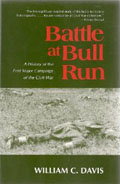 I
have just returned from a trip to the Washington, D.C. area, where I
was able to go to the 150th Re-enactment of the Battle of Manassas,
which opened up the Civil War. [Well, not true, but it was the
first big battle.] Upon returning I grabbed this book from my
collection and started to read it. I know I got it many years
ago (it has a 1977 print date on it), but I don't think I actually
read it then. Anyway, once opened, I can't put it down.
It is very well-written (and researched). Great comments out
at Amazon, which I hope to add to when I'm done with it.
I
have just returned from a trip to the Washington, D.C. area, where I
was able to go to the 150th Re-enactment of the Battle of Manassas,
which opened up the Civil War. [Well, not true, but it was the
first big battle.] Upon returning I grabbed this book from my
collection and started to read it. I know I got it many years
ago (it has a 1977 print date on it), but I don't think I actually
read it then. Anyway, once opened, I can't put it down.
It is very well-written (and researched). Great comments out
at Amazon, which I hope to add to when I'm done with it. |
 |
|
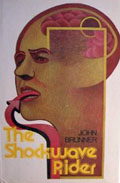 I
have been taking many on-line classes at the Mises Institute.
In the summer of 2010 I took a short course titled, "Economics
of Private Legal and Defense Services." Basically, it was
about how a modern society can exist (and thrive) without the
state. Fascinating stuff. In one of the chats, I
wondered about whether some elements of this kind of state-less
society was exhibited in any science fiction. I was recalling
John Brunner's Shockwave Rider at the time. The hero is,
essentially, trying to escape the state. So, I dusted it off
and am re-reading this "classic." I
have been taking many on-line classes at the Mises Institute.
In the summer of 2010 I took a short course titled, "Economics
of Private Legal and Defense Services." Basically, it was
about how a modern society can exist (and thrive) without the
state. Fascinating stuff. In one of the chats, I
wondered about whether some elements of this kind of state-less
society was exhibited in any science fiction. I was recalling
John Brunner's Shockwave Rider at the time. The hero is,
essentially, trying to escape the state. So, I dusted it off
and am re-reading this "classic." |
 |
|
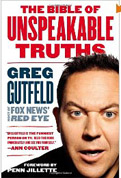 I
have been an occasional viewer of Red
Eye w/Greg Gutfeld. But, it's on late at night. I
had resisted recording it as I knew I would get sucked in and start
watching it all the time. Well, that has now happened. I
have left instructions that if I become comatose, that everybody
should leave the plug in and play Red Eye, Glenn Beck's show and all
the sci fi movies/shows that I have, in an endless loop. I
don't know if that will help, but it seems like it's worth a
try. I have since decided to replace Glenn Beck on my list
with Judge Napolitano and John Stossel. I
have been an occasional viewer of Red
Eye w/Greg Gutfeld. But, it's on late at night. I
had resisted recording it as I knew I would get sucked in and start
watching it all the time. Well, that has now happened. I
have left instructions that if I become comatose, that everybody
should leave the plug in and play Red Eye, Glenn Beck's show and all
the sci fi movies/shows that I have, in an endless loop. I
don't know if that will help, but it seems like it's worth a
try. I have since decided to replace Glenn Beck on my list
with Judge Napolitano and John Stossel.
As the summer
of 2010 comes to a close, and my work load increases, I expect to be
able to keep up with Gutfeld's newly published book of essays, that
range from a couple of short paragraphs to a couple of pages.
His take on reporters that do "homeless" stories is
exactly what everybody knows, but nobody says. And, how could
you disagree with him that Doonesbury is a "sack of
poop?" His words, not mine. I would have used
"pouch." |
 |
|
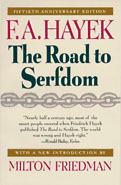 I
have started Hayek's classic at least twice. But, somewhere a
few chapters into it, I have gotten bogged down, set the book aside,
and then not come back to it. Yet, it enjoys a great
reputation. During the summer of 2010, the Mises Institute
offered an on-line class covering this book, so I signed on.
As I near the end of this course, I see why it is so hard to read -
Hayek is not exactly a scintillating writer. I want to look up
the Readers Digest condensed version to see how it reads. I
think I may decide that Friedman's Capitalism and Freedom is the
better choice. By the way, the image is hyperlinked to
Amazon's newer edition, while the image is of the older edition that
I own. I
have started Hayek's classic at least twice. But, somewhere a
few chapters into it, I have gotten bogged down, set the book aside,
and then not come back to it. Yet, it enjoys a great
reputation. During the summer of 2010, the Mises Institute
offered an on-line class covering this book, so I signed on.
As I near the end of this course, I see why it is so hard to read -
Hayek is not exactly a scintillating writer. I want to look up
the Readers Digest condensed version to see how it reads. I
think I may decide that Friedman's Capitalism and Freedom is the
better choice. By the way, the image is hyperlinked to
Amazon's newer edition, while the image is of the older edition that
I own.
|
 |
|
 As
part of the treatment for my thyroid cancer, I had to spend a couple
of days in the hospital. I had to ingest some radioactive
iodine to kill off the remaining thyroid cells in my system,
following surgery to remove the thyroid. So, I took in a worn
copy of Atlas Shrugged, which I have twice started, but never
finished. Hopefully, the third time is a charm. [I
couldn't take anything with me that I couldn't leave behind, because
of my radioactive state, hence the old, worn copy.] As
part of the treatment for my thyroid cancer, I had to spend a couple
of days in the hospital. I had to ingest some radioactive
iodine to kill off the remaining thyroid cells in my system,
following surgery to remove the thyroid. So, I took in a worn
copy of Atlas Shrugged, which I have twice started, but never
finished. Hopefully, the third time is a charm. [I
couldn't take anything with me that I couldn't leave behind, because
of my radioactive state, hence the old, worn copy.]
Well, I got up
to page 150, so only abut 15% through the book, before I was set
free. I enjoyed this first section much more than in the
past. The whole "feel good" mumbo jumbo of the
status quo characters is spot on. And, yet, Rand doesn't have
other characters verbally confront this attitude, but she shows it
in their actions. What a great way to illustrate this
contrast. I
was able to follow a pretty good regimen at home, reading some in
the morning, but only for a while. At page 275, I had to set
aside this effort, as other tasks consumed my time during the summer
of 2010. So, I'll have to get back to this later . . . |
 |
|
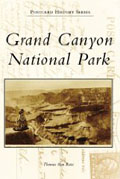 This new book by
Thomas Ratz is a collection of postcards that the author has
collected over the last 30 years, while working at the El Tovar,
located on the rim of the Grand Canyon. I was able to get a
copy and meet Ratz when he was doing a book signing at a local
bookstore. We chatted about some of the postcards he brought
along, which are in the book. Fascinating stuff, although I
wish he had been able to do some of them in color. I learned
that the Kolb brothers took photos to be used for individual
postcards by early visitors to the canyon. [2009] This new book by
Thomas Ratz is a collection of postcards that the author has
collected over the last 30 years, while working at the El Tovar,
located on the rim of the Grand Canyon. I was able to get a
copy and meet Ratz when he was doing a book signing at a local
bookstore. We chatted about some of the postcards he brought
along, which are in the book. Fascinating stuff, although I
wish he had been able to do some of them in color. I learned
that the Kolb brothers took photos to be used for individual
postcards by early visitors to the canyon. [2009]
|
 |
|
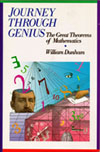 A
fascinating look at the history of mathematics, with nice details and
context for what Dunham calls the "great theorems." I
read this in 1990 and have just picked it up to read again in late 2009. A
fascinating look at the history of mathematics, with nice details and
context for what Dunham calls the "great theorems." I
read this in 1990 and have just picked it up to read again in late 2009.
The earlier theorems are
most memorable to me, partly because I think I can better relate to
their elegance. I have much more difficultly wrapping my mind
around the whole idea of Cantor's infinite vs. finite
"infinites." So it goes. |
|





























